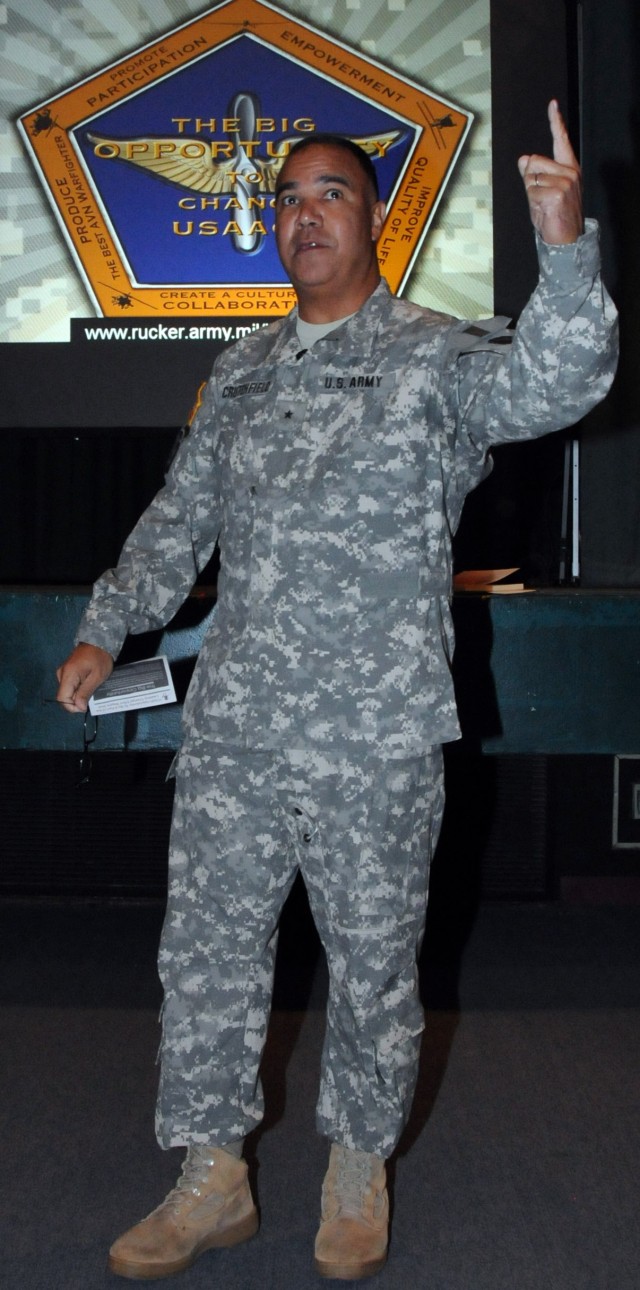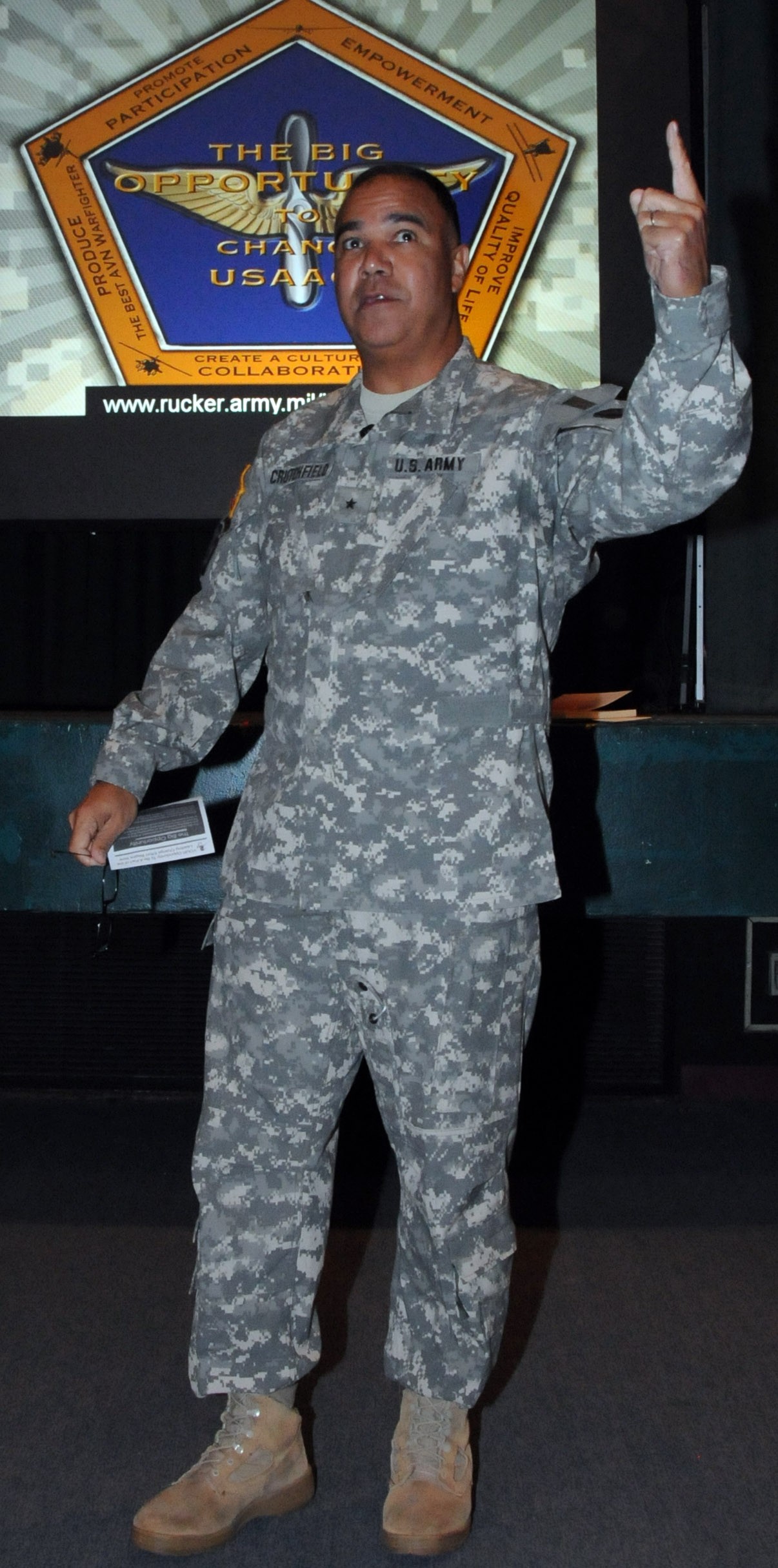FORT RUCKER, Ala. -- The Leading Change Team gave post officials, Soldiers and civilians a chance to voice their ideas and concerns during the LCT Change Summit at the post theater Oct. 7.
"This is a great opportunity to answer some questions and explain what it is we do here," said Wade Becnel, U.S. Army Aviation Center of Excellence chief knowledge officer and master of ceremonies for the Change Summit. "We want you to think about what kind of environment you'd like to work and live in, in the future."
Brig. Gen. Anthony G. Crutchfield, USAACE and Fort Rucker commanding general, encouraged those in attendance to join the LCT and help facilitate change here.
"This is not going away, it's a fact of life," he said of the LCT efforts. "Some of you are here because you were told to be here, but when you leave today I want you to be volunteers. I need your help. I know you can stand up and do the right thing. Take it to the next step and get committed to this."
Crutchfield said he wants Soldiers and civilians to not be afraid of bringing up ideas they have for the post to the installation leadership.
"Don't be afraid of change. I want you to lead it," he said. "Change will happen with or without you. I just want it to be with you."
LCT members work in five different categories aimed at improving different aspects of life at Fort Rucker. Those categories are empowerment, promote participation, collaboration, produce the best Aviation warfighter and quality of life.
Representatives from each of the five sections addressed the efforts they have made over the past year to help make change a reality for the installation.
"When I was a (private first class) I remained silent about things I saw that needed changing," said Sgt. 1st Class James Loudermilk, Air Traffic Services standardization noncommissioned officer in charge and empowerment spokesperson. "I'm here today to tell you that silence is no longer acceptable. As we head into our 10th year of sustained conflict, that's no longer acceptable. It is our responsibility to identify what needs to be improved in the environment around us. Empowerment's mission is to communicate that every member of our team is important and must be heard."
David Wiedemann, Capability Development and Integration Directorate Aviation specialist and participation spokesperson, asked that those with ideas not just talk about them, but do something about them.
"We are not a group of people who are going to solve all the problems; trying to fix it ourselves would severely limit our scope," he said. "We are a core group of motivated individuals from organizations across USAACE, seeking out your solutions and encouraging people to form groups with the appropriate expertise to tackle the issues."
The collaboration spokesperson, Cynthia Ranchino, Plans, Analysis and Integration Office lead plans specialist, said the only way to make the change work is by working together.
"It is through effective collaboration that we can enable informed decisions and better serve the interests of all," she said. "Some of the concepts behind the culture of collaboration are information sharing, open communication, seeking out innovative solutions, embracing new technologies, coming together to work collective solutions, having a sense of community and always ensuring that the work we do is meaningful and adds value to a desired goal."
Producing the best Aviation warfighter is another primary goal of the LCT and the individuals in the LCT warfighter effort are committed to achieving all the goals they have set, according to Capt. Anne McClain, C Company, 1st Battalion, 14th Aviation Regiment commander.
"In the warfighter group, we're where the rubber meets the road," she said. "Our warfighters aren't just flight school students; they're also air traffic controllers and flight operations personnel and all of them must be equipped to perform their mission by the time they leave these gates."
Many in the room raised their hands when McClain asked how many were experiencing delays in getting into classes they need due to a "large training backlog."
"We're well on the path to eliminating this backlog," she said. "Everyone at Fort Rucker is dedicated to reducing the amount of time you're waiting for courses."
Maj. Ethan Dial, 1st Battalion, 145th Aviation Regiment executive officer, spoke to attendees about how the LCT is improving the quality of life at Fort Rucker and why it's an essential part of the LCT.
"We were amazed at the variety of things we're able to work on in the quality of life group," he said. "These possibilities range from child and health care to Soldier and Family housing, the library and fitness centers, the bowling alley and golf course, just to name a few. This is why we need you to continue giving us your ideas on what we can do to make the quality of life here better. Our purpose is to support the training focus of generating the best Aviation professionals and warfighters."
For more information on the summit or the LCT, visit www.rucker.army.mil/leadingchange. To share ideas or submit questions to the LCT, e-mail ruck.lct@conus.army.mil.


Social Sharing